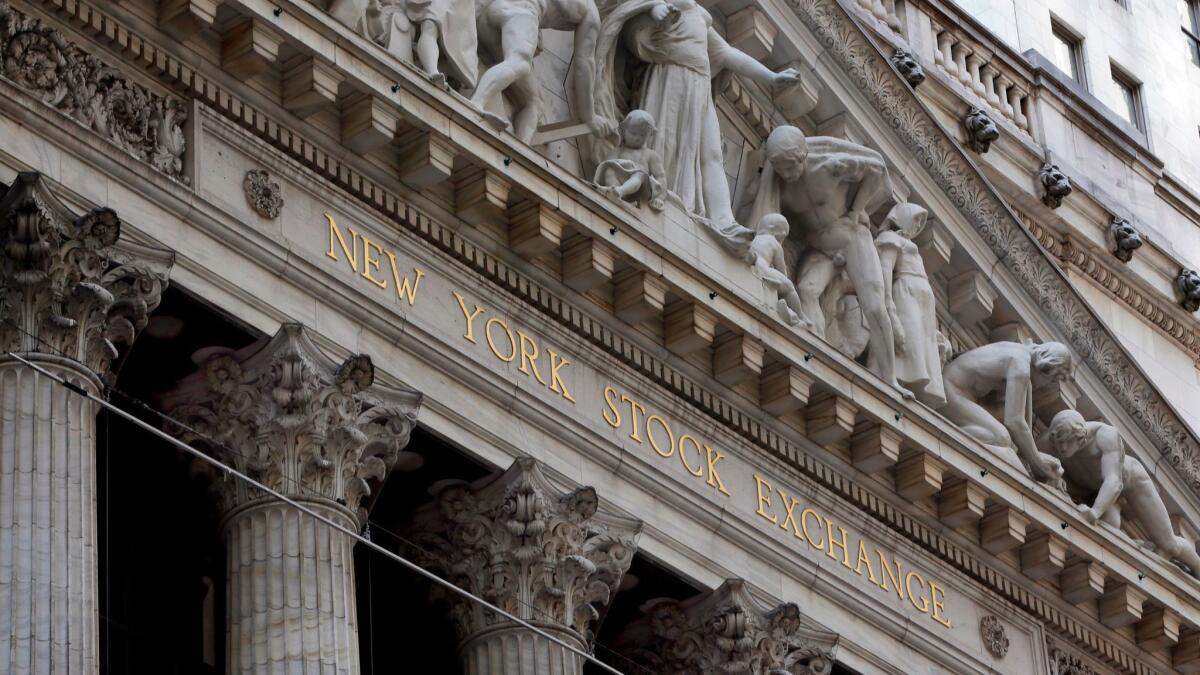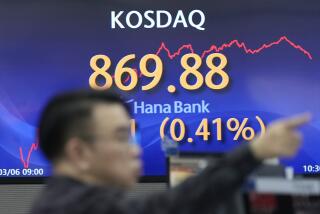Stock market drops into the red for the year; Dow falls about 550 points

The U.S. stock market sank Tuesday, falling back into the red for the year, as shares of the world’s largest technology companies racked up more losses. Retailers also fell, and energy companies plunged with oil prices.
Oil prices added to their recent losses, tumbling 6.6% as Wall Street reacted to rising oil supplies and concerns that global economic growth will slow down, a worry that’s intensified because of the trade tensions between the United States and China. U.S. crude has plunged 30% since early October.
Technology companies took a hit after the Trump administration proposed new national security regulations that could limit exports of high-tech products in fields such as quantum computing, machine learning and artificial intelligence.
Retailers also skidded. Target’s profit disappointed investors as the company spends more money to revamp its stores and website.
The Standard & Poor’s 500 index slid 48.84 points, or 1.8%, to 2,641.89. The Dow Jones industrial average sank 551.80 points, or 2.2%, to 24,465.64. The tech-heavy Nasdaq composite fell 119.65 points, or 1.7%, to 6,908.82. The Russell 2000 index of smaller-company stocks slid 27.53 points, or 1.8%, to 1,469.01.
The Dow has lost 3.7% in the last two days, and the S&P 500 is off 3.4%. The Nasdaq, heavily populated with technology stocks, is down 4.7%.
The S&P 500 has fallen 9.9% from the record high it set exactly two months ago.
Investors are measuring head winds and increasingly playing it safe. The global economy is showing signs of weakening, with the United States, China and Europe all facing the rising threat of a slowdown, which can hurt demand for commodities such as oil and pose a threat to company profits. U.S.-China trade tensions appear to be getting worse, contributing to the sell-off in tech stocks and multinational industrial companies.
For much of this year, investors were hopeful the United States and China would easily resolve their differences on trade. That hope has faded in the last two months. Later this month, President Trump and China President Xi Jinping are expected to meet at a gathering of the Group of 20 major economies, and for investors, the newly proposed limits on tech exports were one more hint the leaders probably won’t reach a deal.
“A resolution doesn’t seem to be coming in the short term,” said Katie Nixon, chief investment officer for Northern Trust Wealth Management. “A lot of the companies that are front and center [such as] Alphabet, Apple, IBM could be significantly limited in the way they export their technology.”
Apple fell 4.8% to $176.98 and is down 23.7% from its Oct. 3 peak, though it’s still up almost 5% this year. Microsoft fell 2.8% to $101.71 on Tuesday. IBM fell 2.6% to $117.20.
Tech stocks were among the biggest losers in Europe too. Nokia and Ericsson, two top suppliers of telecom networks, each fell about 3%.
As the tech giants swoon, investors have lately turned to traditionally safer bets such as utilities, real estate companies and makers of household goods. They’ve also sought the safety of U.S. Treasuries.
Earnings from retailers didn’t help investors’ mood. Target skidded 10.5% to $69.03 after reporting earnings that missed Wall Street’s estimates because of higher expenses. Ross Stores, TJX and Kohl’s fell on disappointing forecasts.
Meanwhile, the price of oil is down 30% since Oct. 3.
Saudi Arabia and other countries started producing more oil this year after the Trump administration announced renewed sanctions on Iran, Nixon said. The administration then granted waivers to several countries allowing them to continue importing Iranian oil, creating a supply glut that pushed prices dramatically lower.
Nixon said OPEC countries probably will cut back on oil production, but some investors are worried that the buildup in crude stockpiles is a sign the global economy isn’t doing as well as expected.
Student loan servicing company Navient dropped 10.6% to $10.73 after the Associated Press reported on an audit by the Department of Education that showed Navient may have driven tens of thousands of borrowers struggling with their debts into higher-cost repayment plans.
Benchmark U.S. crude closed at $53.43 a barrel in New York, its lowest price in a little more than a year. Brent crude, used to price international oils, fell 6.4% to $62.53 a barrel in London.
Wholesale gasoline fell 5.5% to $1.50 a gallon. Heating oil fell 4.6% to $1.99 a gallon. Natural gas fell 3.8% to $4.52 per 1,000 cubic feet.
Bond prices were steady. The yield on the 10-year Treasury note remained at 3.06%.
Gold slipped 0.3% to $1,221.20 an ounce. Silver fell 0.9% to $14.27 an ounce. Copper fell 1.2% to $2.77 a pound.
The dollar fell to 112.40 yen from 112.54 yen. The euro fell to $1.1399 from $1.1453.
UPDATES:
3:30 p.m.: This article was updated with closing prices and context.
1:05 p.m.: This article was updated with the close of markets.
10:45 a.m.: This article was updated with more recent market prices, context and analyst comment.
7:25 a.m.: This article was updated with market prices and context.
This article was originally published at 7:15 a.m.





